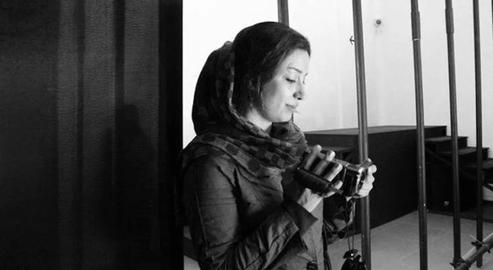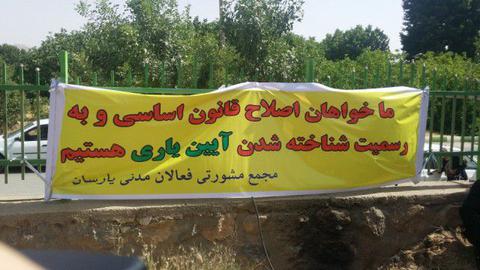From the Tehran highway to the airport at Ecuador, then on to Peru and Brazil in the clutches of a people-smuggler, and finally thrown to a protracted and unjust detention. The tumultuous recent experience of Mahnaz Alizadeh, camerawoman for a recently-released documentary about the life and times of human rights lawyer Nasrin Sotoudeh, may someday be worthy of a film in its own right.
Mahnaz Alizadeh is a cinema and theater graduate, and the creator of several award-winning animated shorts. One of her last jobs in Iran before she left the country last year was working with the news website Rouzarouz.
Her long-time acquaintance and collaboration with Nasrin Sotoudeh goes back to the mid-1990s, when she photographed and filmed the “One Million Signatures” campaign, which aimed to end discriminatory laws against Iranian women. Some of the first published photos of Nasrin Sotoudeh were hers, and the pair spent hours working together on a daily basis from 2016 to 2018 to gather material for the new documentary.
Threatened by Security Agencies
“Because Ms. Sotoudeh herself had invited me to film the documentary,” Alizadeh says, “it was decided that I could not know any of the other members of the crew. I was present for all of her public events and trials.”
A prominent barrister in Iran for many decades, Nasrin Sotoudeh has been imprisoned since May 2018 for defending women’s rights activists in her capacity as a lawyer. She has since been sentenced to more than 30 years in prison on a string of spurious charges, and is the subject of an international campaign for her unconditional release.
Even before Nasrin’s arrest, Alizadeh says, she and other crew members were put under pressure by security agencies because of their association with Nasrin. "Before the editing phase started and during the filming process,” she says, “I was threatened in various ways. A lot of the filming was done in Ms. Sotoudeh's car while driving, and on many occasions we were harassed by the occupants of other cars.
“They also sent a message to Ms. Sotoudeh through her imprisoned clients, telling her ‘If you don’t stop making the film, we’ll arrest the camerawoman, Mahnaz’. One day, Ms. Sotoudeh came to our house and said that she would not accept my being imprisoned over this film.”
Eventually it was decided that Alizadeh should step back from the project. But after Nasrin was arrested in 2018, and after the editing of the film began, Alizadeh began to receive threatening calls again from the security agencies.
Even though Alizadeh has faced arrest before – during the Green Movement, when she was handed a two-year suspended sentence and a fine – the extent of pressure this time was so intolerable, she says, that she felt forced to leave the country.
“It was in December last year, when the threats reached their peak, that I applied for a Canadian tourist visa through my friend Mr. Bahman Sahami,” she explains. “His brother, Reza Sahami, had repeatedly said that he was in the business of immigration and visas for Canada. I decided to leave for a while, and thought I would return to Iran after the problems subsided or else apply for asylum in Canada."
Flying to the Height of Crisis
Mahnaz Alizadeh's flight to Canada took place on January 8, 2020, just hours after a Ukrainian passenger plane had been shot out of the skies over Tehran by the Islamic Revolutionary Guard Corps. Her journey was marked by death from the very beginning, and by an all-pervading anxiety.
She flew from Tehran to Qatar, and from there to Ecuador in South America. But on arrival there, she says, “Reza Sahami, my longtime friend's brother, displayed a totally different face. While they were due to be paid just $5,000 out of a total of $12,000 before I arrived in Canada, I was abruptly told in Ecuador that if I did not pay the full amount, I would be left in that country.
“My family scraped together sent the total amount and sent it to Mr. Sahami. But then he broke our agreement again: although I had a passport, this person wanted to send me to Canada illegally with a fake passport. I knew anyone who accepted this would be arrested and deported at the border. I didn’t want to take the risk.”
It was at this point that Mahnaz Alizadeh realized the true identity of Reza Sahami as a human trafficker. She tried to gather information about his connections and activities to submit to the police, and ended up staying in Ecuador for three months in total, searching for new ways to get to Canada.
“While in Ecuador,” she says, “I learned that the US police and Interpol were looking for Reza Sahami. His clients were frequently arrested in various countries in South America for document forgery, human trafficking and other offenses. After a wave of client arrests on the Ecuadorian border, he decided to smuggle me and several others across to Peru – and from there to Canada. In Peru, when we tried to go first to Lima and then to Canada with fake passports, the police arrested Sahami together with several passengers. Strangely, he was released shortly afterwards.”
Alizadeh then spent six difficult months in Peru, now hundreds of miles away from home and in a country with an unfamiliar language and culture. All she had wanted to was capture the work of a human rights defender in her home country.
“By this time”, she says, “the coronavirus pandemic had started and all the borders were strictly controlled. In Peru, I tried to go to the UNHCR office to apply for asylum, but when Sahami found out he stopped me. Next, Sahami went to a city on the border with Brazil and asked us to accompany him. We crossed over – and the border guards arrested us.”
End of the Line
"Right at the moment of my arrest,” Alizadeh recounts, “Sahami threw his cell phone into my bag. Later, because no evidence was found against him -- as all of it was in my bag – he was released while we remained in federal custody.
“Eight days later, when his documents were found in my luggage, the other passengers who had arrived in Brazil with Israeli passports were deported, because they said they did not know Reza Sahami. But I was summoned to court on charges of collaborating with Sahami."
No matter how hard she tried, speaking in English with the Brazilian federal authorities and pleading with them to understand she was not a colleague of Sahami’s, Alizadeh says her words fell on deaf ears. "For fifty days,” she says, “without a lawyer, without any communication and without any health provision, I was held in Brazilian prison.
“Then in October last year, quite strangely, I was released on bail until the trial. After my release, Reza Khandan [Nasrin’s husband] and several human rights organizations, especially the Abdorrahman Boroumand Center for Human Rights, worked hard to prevent my being returned to Iran. Many friends who knew Sahami testified to the Brazilian judiciary that I was not his colleague, but a client."
For months now, Mahnaz Alizadeh – herself a former activist for children’s charities – has been alone and exposed, having to face down both Reza Sahami's expensive lawyers and closely- acquainted members of the judiciary in South America. “Given that Sahami has a very broad connections,” she says, “I do not feel safe at all. And unfortunately the international community is not responding to my concerns.
“I’m not even allowed to work in this part of the world. All my belongings, including my phone, have been confiscated by the police. My gold and clothes have been confiscated. Only my family and some of my friends are helping me to make a living. Even my insurance booklet and antidepressants are in the hands of the police, and I have a serious problem getting medicine here. I feel that I’m alone here, in a blind spot. I cannot envisage any future for myself.”
Related coverage:
Nasrin Documentary Director: "So Many Like Her are at Risk"
Nasrin Sotoudeh Released on Furlough
Human Rights Attorney Vows to Continue Hunger Strike in Prison
visit the accountability section
In this section of Iran Wire, you can contact the officials and launch your campaign for various problems




























comments